
Understand your company's position and learn more about the options available
Require Immediate Support? Free Director Helpline: 0800 644 6080
Free Director Helpline: 0800 644 6080
Updated:
If your company is experiencing increased pressure from creditors and suppliers, you should seek immediate advice from a licensed insolvency practitioner who will be able to talk you through your options. Ignoring your suppliers, unpaid invoices, and the debt you owe to creditors will not make the problem go away, instead you are likely to find your creditors simply pile further pressure on you and your company until a resolution is found.
If you are experiencing increasing pressure from creditors and suppliers and your company is not in the position to be able to pay its bills, invoices, debt repayments as and when they fall due, this is a huge warning sign that your business may be insolvent, or is on the road to becoming insolvent.
Mounting pressure from suppliers and falling behind in your payments and owed invoices to creditors should be seen as a sign that all is not well with the financial health of your business. While the situation may seem insurmountable, rest assured there are a range of options available to companies in exactly this position.

Free 60 Second Test
For Ltd Company Directors
What are you looking to do?
Choose below:
If your company is struggling to keep up with its payments and owed invoices to suppliers, your first step should be to enter into informal negotiations to see whether you can come to a mutually beneficial arrangement. If you remain co-operative with your creditors and suppliers, you may be surprised at how amenable they are to an informal payment plan.
Depending on the severity of your company's financial woes, however, this may not be possible. If you owe significant amounts to a number of different creditors with a pile of unpaid invoices, or you believe your company to be insolvent, you are advised to seek professional advice from a licensed insolvency practitioner as a matter of urgency.
Once you have appointed the services of a licensed insolvency practitioner - whether this is to liquidate the business or to attempt a rescue via an administration process - you will find that creditor pressure is immediately lifted.
The insolvency practitioner will liaise with creditors, including your suppliers, on your behalf, informing them of the company's position, and the likelihood of them receiving the money they are owed from unpaid debts and invoices. Many directors find that the pressure from suppliers is extremely stressful, and that having this lifted is a huge weight off their minds.
“After submitting my '60 Second Test' I received a complimentary Insolvency Options guide packed full of useful information. The team of insolvency specialists phoned me back in less than 10 minutes after reviewing my details and guided me through the next steps. Really helpful! Thank you Sophie!”
Patricia
Depending on your company's financial position, future viability, and the appetite of its directors to continue trading, there are a number of options available to help relieve supplier pressure:
Mounting creditor pressure?
If your creditors are growing increasingly impatient, it is time to take action. Ignoring the situation is only likely to make it worse. Take the first step today by contacting Real Business Rescue for immediate help and advice.
The team are available now - 0800 644 6080
Get a Quote Find Your Nearest Office
If the company's financial pressures have taken it beyond the point of rescue and you know you have no realistic chance of being able to repay all its debts and settle all outstanding invoices, it may be the case that liquidation is the only viable solution. There are two forms of liquidation:
If your company is struggling with unmanageable debts, squeezed cash flow, or an uncertain future, you are far from alone. We speak to company directors just like you every single day, and we are here to give you the help and advice you need.
Call our team today on 0800 644 6080
When your company can't afford to keep up with its financial obligations, operating a business can become extremely stressful. As insolvency practitioners we're licensed to provide you with the right advice and expert guidance you need during these times.
If you are facing increasing pressure from suppliers or other creditors, can't pay your company's debts and invoices, and you don't know which way to turn, contact our team today for immediate help and advice.
Still unsure whether liquidation is right for your company? Don't worry, the experts at Real Business Rescue are here to help. Our licensed insolvency practitioners will take the time to understand the problems your company is facing before recommending the best course of action going forward based on your own unique circumstances.

Complete the below to get in touch
For Ltd Company Directors
What are you looking to do?
Choose below:
We provide free confidential advice with absolutely no obligation.
Our expert and non-judgemental team are ready to assist directors and stakeholders today.

Understand your company's position and learn more about the options available

Find your nearest office - we have more than 100 across the UK. Remote Video Meetings are also available.

Free, confidential, and trusted advice for company directors across the UK.